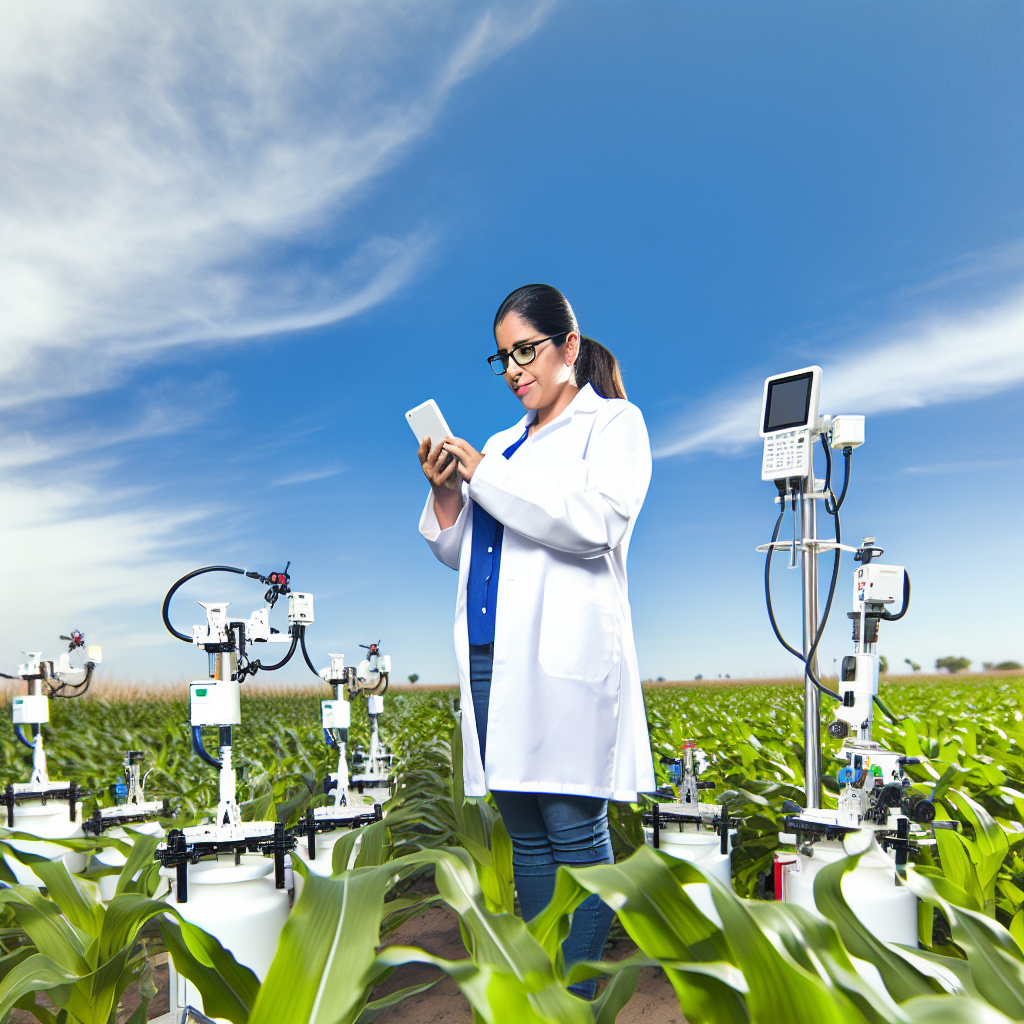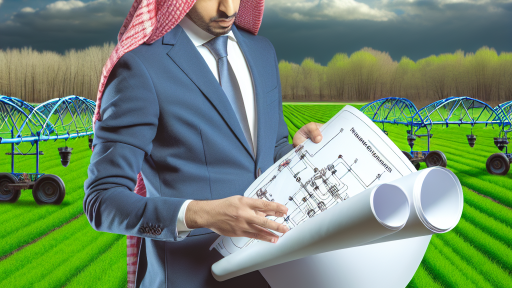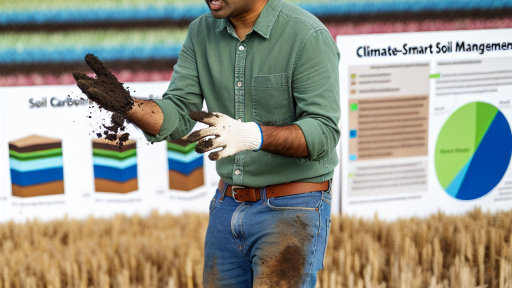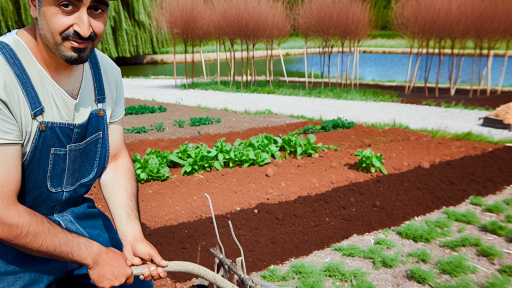Overview of Climate-Smart Agriculture and its Importance
Definition and Purpose
Climate-smart agriculture focuses on sustainable farming practices.
It aims to increase productivity and resilience to climate change.
Additionally, it enhances food security while reducing greenhouse gas emissions.
Significance in Today’s Context
Climate change poses significant challenges to global agriculture.
This approach equips farmers to adapt to changing climate conditions.
Furthermore, it promotes efficient resource use and sustainability.
Benefits of Climate-Smart Agriculture
- It boosts agricultural productivity under changing climate conditions.
- It helps reduce vulnerability to climate impacts.
- Moreover, it enhances resilience within local farming communities.
Technological Integration
Integrating technology plays a crucial role in climate-smart agriculture.
For instance, precision agriculture enhances resource management.
Moreover, data analytics helps predict weather patterns and crop yields.
Importance of Climate-Smart Agriculture
Climate-smart agriculture is essential for sustainable food systems.
It not only addresses climate change but also promotes global food security.
Role of Technology in Enhancing Agricultural Productivity
Precision Agriculture
Precision agriculture improves crop management through technology.
It utilizes GPS and sensors to monitor field variability.
This approach helps farmers optimize inputs like water and fertilizer.
As a result, it increases both yield and sustainability.
Transform Your Agribusiness
Unlock your farm's potential with expert advice tailored to your needs. Get actionable steps that drive real results.
Get StartedFarmers can make informed decisions based on real-time data.
Data Analytics and Decision Making
Data analytics plays a crucial role in modern agriculture.
It helps in analyzing weather patterns and soil conditions.
Farmers can predict crop performance with increased accuracy.
Furthermore, data-driven insights enhance planning and resource allocation.
Companies like AgriTech Solutions offer innovative platforms for this purpose.
Drones and Remote Sensing
Drones revolutionize crop monitoring and management.
They provide aerial imagery for better assessment of crops.
This technology identifies problem areas that need attention.
Additionally, drones can facilitate timely and targeted interventions.
As a result, they contribute to reduced input costs.
Advanced Irrigation Systems
Advanced irrigation systems enhance water efficiency in agriculture.
These systems incorporate sensors that monitor soil moisture levels.
Farmers can automate irrigation schedules based on crop needs.
Consequently, this reduces water waste significantly.
Drip irrigation and sprinkler systems are among the most effective methods.
Biotechnology and Genetic Engineering
Biotechnology improves crop resilience and productivity.
Genetic engineering leads to the development of pest-resistant crops.
These crops require fewer chemical inputs for pest management.
Moreover, they can thrive in challenging environmental conditions.
Companies like BioGen Innovations focus on sustainable genetic improvements.
Integrating IoT in Farming
The Internet of Things (IoT) transforms agricultural practices.
Smart sensors in fields collect valuable data continuously.
This data enables farmers to monitor their crops remotely.
Showcase Your Farming Business
Publish your professional farming services profile on our blog for a one-time fee of $200 and reach a dedicated audience of farmers and agribusiness owners.
Publish Your ProfileMoreover, IoT technology provides alerts for necessary actions.
The result is an increase in efficiency and productivity.
Case Studies of Successful Technology Integration in Agriculture
Innovative Use of Drones in Crop Monitoring
Drones revolutionize crop monitoring and data collection.
This technology offers farmers a bird’s eye view of their fields.
Farmers can identify issues like pest infestations or nutrient deficiencies quickly.
Moreover, companies like AgEagle provide advanced drone technologies tailored for agriculture.
For instance, their drones can map fields and analyze crop health efficiently.
Implementation of Smart Irrigation Systems
Smart irrigation systems optimize water usage significantly.
These systems use sensors to monitor soil moisture levels continuously.
Farms using this technology have reported water savings of up to 50%.
Moreover, companies like CropX specialize in soil data analytics for irrigation.
The data helps farmers apply the right amount of water at the right time.
Benefits of Precision Farming Technologies
Precision farming focuses on maximizing outputs while minimizing inputs.
This approach uses GPS technology to guide farm equipment accurately.
Farmers can recognize variabilities in their fields and address them effectively.
As a result, they can improve yield quality and quantity sustainably.
Companies like Trimble offer precision farming solutions that enhance productivity.
Leveraging Data Analytics for Crop Management
Data analytics provides insights into various aspects of crop management.
With predictive analytics, farmers anticipate market trends and consumer demands.
This foresight helps them align their production strategies accordingly.
Additionally, tools such as Climate FieldView help farmers monitor their fields remotely.
Their platform integrates data from multiple sources for informed decision-making.
Adoption of Mobile Applications for Farmer Support
Mobile applications play a critical role in supporting farmers.
These apps provide resources and information on best farming practices.
They also connect farmers with experts and other farmers for support.
Apps like FarmLogs enable real-time tracking of farm activities.
Furthermore, they offer weather forecasts and market prices for informed decisions.
You Might Also Like: Drip Irrigation Benefits for Today’s Farmers
Data-Driven Decision Making: Utilizing Agricultural Analytics
Importance of Agricultural Analytics
Agricultural analytics plays a crucial role in modern farming.
It enhances decision-making through data-driven insights.
Farmers can increase efficiency and improve yields using analytics.
Moreover, it helps in managing resources more effectively.
Types of Agricultural Data
Farmers utilize various types of data for analytics.
Weather data predicts environmental conditions effectively.
Soil health data informs agronomic decisions.
Crop yield data provides insights for future planning.
Market trends data helps farmers in pricing strategy.
Tools for Data Collection
Modern technology offers multiple tools for data collection.
Satellite imagery provides a broad view of crop health.
Drones offer precise aerial mapping of agricultural fields.
Showcase Your Farming Business
Publish your professional farming services profile on our blog for a one-time fee of $200 and reach a dedicated audience of farmers and agribusiness owners.
Publish Your ProfileSoil sensors collect real-time information on soil conditions.
Mobile apps allow farmers to log data on the go.
Applications of Analytics in Agriculture
Analytics finds diverse applications in agriculture.
- Precision farming enhances resource application accuracy.
- Predictive analytics forecasts crop yields effectively.
- Supply chain analytics optimizes logistics and distribution.
- Financial analytics helps farmers manage budgets and expenses.
Challenges in Implementing Agricultural Analytics
Implementing agricultural analytics comes with challenges.
Data management can overwhelm farmers lacking technical expertise.
Additionally, high costs may deter smaller operations.
Integrating data from multiple sources poses a difficulty.
Lastly, ensuring data privacy and security is paramount.
Future of Data-Driven Agriculture
The future holds great promise for data-driven agriculture.
Advancements in artificial intelligence will enhance analytics.
Machine learning algorithms will optimize farming practices.
Furthermore, increased connectivity will broaden data access.
Collaborative platforms will grow, creating farmer networks.
You Might Also Like: Weather-Proofing Farms with Adaptive Practices
Precision Agriculture: Tools and Techniques for Efficient Farming
Understanding Precision Agriculture
Precision agriculture utilizes technology to enhance farming practices.
It enables farmers to manage their fields with great accuracy.
This method improves crop yields and reduces waste.
Furthermore, it contributes to environmental sustainability.
Key Technologies in Precision Agriculture
Farmers today use a variety of tools to implement precision agriculture.
Satellite imagery provides critical data on crop health.
Sensor technologies monitor soil moisture and nutrient levels.
Additionally, drones facilitate crop surveillance over vast areas.
Data Analytics
Data analytics plays a vital role in precision agriculture.
Farmers collect vast amounts of data through their technologies.
They analyze this data to make informed decisions about farming practices.
For example, they can determine the optimal times for irrigation.
GPS Technology
GPS technology allows for precise tracking of equipment and crop locations.
This technology helps in mapping fields for better management.
It enhances resource allocation and boosts efficiency.
Benefits of Precision Agriculture
Precision agriculture offers numerous advantages for modern farming.
It significantly reduces the use of water, fertilizers, and pesticides.
This approach minimizes negative environmental impacts.
It also increases profitability by maximizing resource efficiency.
Improved Crop Yields
With precision agriculture, farmers achieve higher and more consistent yields.
This occurs due to tailored interventions based on data insights.
Farmers can identify issues early and address them effectively.
Cost Savings
Another benefit is cost savings on inputs and labor.
Farmers utilize only what they need, reducing excess costs.
This efficient use of resources leads to significant financial benefits.
Challenges in Implementing Precision Agriculture
While precision agriculture presents many benefits, it also has challenges.
Showcase Your Farming Business
Publish your professional farming services profile on our blog for a one-time fee of $200 and reach a dedicated audience of farmers and agribusiness owners.
Publish Your ProfileInitial investment costs can be high for advanced technologies.
Farmers may require training to utilize these tools effectively.
Moreover, there can be issues related to data privacy and security.
Investment and Cost-Effectiveness
Many farmers struggle with the upfront costs of technology.
Thus, it is important to demonstrate long-term savings.
Ultimately, a well-thought-out plan can offset these initial expenses.
Technological Literacy
Farmers and workers must understand new technologies.
Training programs and workshops can help bridge this gap.
Increased literacy leads to better implementation of best practices.
Find Out More: Integrating Bioenergy into Eco-Friendly Agriculture

Innovations in Irrigation
Smart Irrigation Systems
Smart irrigation systems use technology to optimize water usage.
These systems employ sensors to monitor soil moisture levels.
They automatically adjust water delivery based on real-time data.
This approach significantly reduces water wastage.
Smart controllers help farmers manage irrigation remotely.
Benefits of Advanced Irrigation Technologies
Improved water conservation is a key benefit.
Farmers can achieve higher crop yields with less water.
Additionally, these systems reduce labor costs.
They minimize the need for manual irrigation management.
Moreover, precision irrigation enhances crop quality.
Types of Smart Irrigation Technologies
- Drip Irrigation: Delivers water directly to plant roots.
- Sprinkler Systems: Uses automated methods for even distribution.
- Soil Moisture Sensors: Monitors moisture levels for efficiency.
- Weather-Based Controllers: Adjusts irrigation based on weather conditions.
Real-World Applications
Various farms around the world have adopted smart irrigation technologies.
For example, Green Leaf Farms uses a combination of sensors and automated systems.
This approach has resulted in a 30% reduction in water usage.
Similarly, Sunny Fields Agriculture implemented smart controllers.
As a result, they reported better crop yields and sustainability.
See Related Content: Sustainable Livestock Management to Minimize Emissions
Sustainable Pest Management: Leveraging Technology for Eco-friendly Solutions
Introduction to Sustainable Pest Management
Sustainable pest management focuses on reducing harmful impacts on the ecosystem.
It emphasizes using environmentally friendly techniques and technologies.
Moreover, it aims to protect crop yields while maintaining biodiversity.
Adoption of Technological Solutions
Farmers now rely on various technologies for pest management.
One example is employing smart sensors in fields.
These sensors monitor pest activity and environmental conditions in real time.
This data empowers farmers to make informed decisions about pest control.
Utilization of Drones
Drones have revolutionized pest management strategies.
They enable aerial surveys of crops to identify infestations quickly.
Consequently, farmers can respond to pest threats much sooner.
This promptness can save significant time and resources.
Biological Control Methods
Biological control methods are also gaining traction among sustainable practices.
This approach involves using natural predators to manage pest populations.
For instance, introducing ladybugs can help control aphids.
Showcase Your Farming Business
Publish your professional farming services profile on our blog for a one-time fee of $200 and reach a dedicated audience of farmers and agribusiness owners.
Publish Your ProfileBy promoting these natural ecosystems, farmers reduce chemical inputs.
Integrating Data and AI
Data analytics and artificial intelligence play crucial roles in modern pest management.
AI algorithms analyze historical data to predict potential pest outbreaks.
This predictive capability helps farmers prepare and act efficiently.
Ultimately, it leads to proactive, rather than reactive, pest control measures.
Advantages of Technology-Driven Solutions
Embracing technology in pest management offers numerous advantages.
- It enhances crop resilience against pest invasions.
- Farmers can decrease their reliance on chemical pesticides.
- Overall, it promotes a healthier ecosystem.
- Additionally, it can result in cost savings over time.
Challenges in Implementation
Despite its benefits, challenges arise when implementing technology.
Some farmers may lack access to resources or training for new technologies.
Moreover, initial costs for technology adoption can be a barrier.
However, the long-term benefits often outweigh these initial challenges.
Future of Sustainable Pest Management
The future of pest management looks promising with continuous advancements in technology.
Collaboration between tech companies and farmers will likely grow.
In turn, this collaboration will develop even more innovative solutions.
Ultimately, sustainable pest management is crucial for resilient agriculture.
Future Trends in Climate-Smart Technology and Their Potential Impact
Advancements in Precision Agriculture
Precision agriculture technology is rapidly evolving.
This trend aims to optimize field-level management.
Farmers can utilize data analytics to improve yields.
They will also make more informed decisions based on real-time data.
For instance, sensors can monitor soil moisture levels.
In turn, this helps in applying water more efficiently.
Emerging Biotechnologies
Biotechnologies will play a crucial role in climate-smart agriculture.
These technologies can develop crops with enhanced resilience.
Innovations in gene editing are making this possible.
Crops engineered to withstand extreme weather conditions will be essential.
This approach supports biodiversity while maximizing productivity.
Integration of Artificial Intelligence
Artificial intelligence is transforming agricultural practices.
AI algorithms predict crop yields and assess risks.
Farmers will benefit from tailored recommendations through AI tools.
This ensures sustainable management of resources.
Moreover, AI-driven solutions can optimize supply chains.
The Role of Blockchain Technology
Blockchain technology enhances transparency in the agricultural sector.
This ensures traceability of produce from farm to table.
Farmers can also establish trust with consumers through blockchain.
Furthermore, secure transactions can improve market access.
Investment in Digital Platforms
Digital platforms for farmers are gaining traction.
These platforms facilitate knowledge sharing and resource management.
Farmers can access market trends and best practices easily.
Additionally, training through online resources will become widespread.
Potential Environmental Benefits
Implementing these technologies contributes to environmental sustainability.
Reduced chemical usage leads to healthier ecosystems.
Showcase Your Farming Business
Publish your professional farming services profile on our blog for a one-time fee of $200 and reach a dedicated audience of farmers and agribusiness owners.
Publish Your ProfileEnhanced monitoring helps maintain soil health and biodiversity.
Consequently, the overall resilience of agricultural systems will improve.
Additional Resources
Study suggests that climate smart agriculture can boost yields …
NRCS Climate-Smart Mitigation Activities | Natural Resources …




